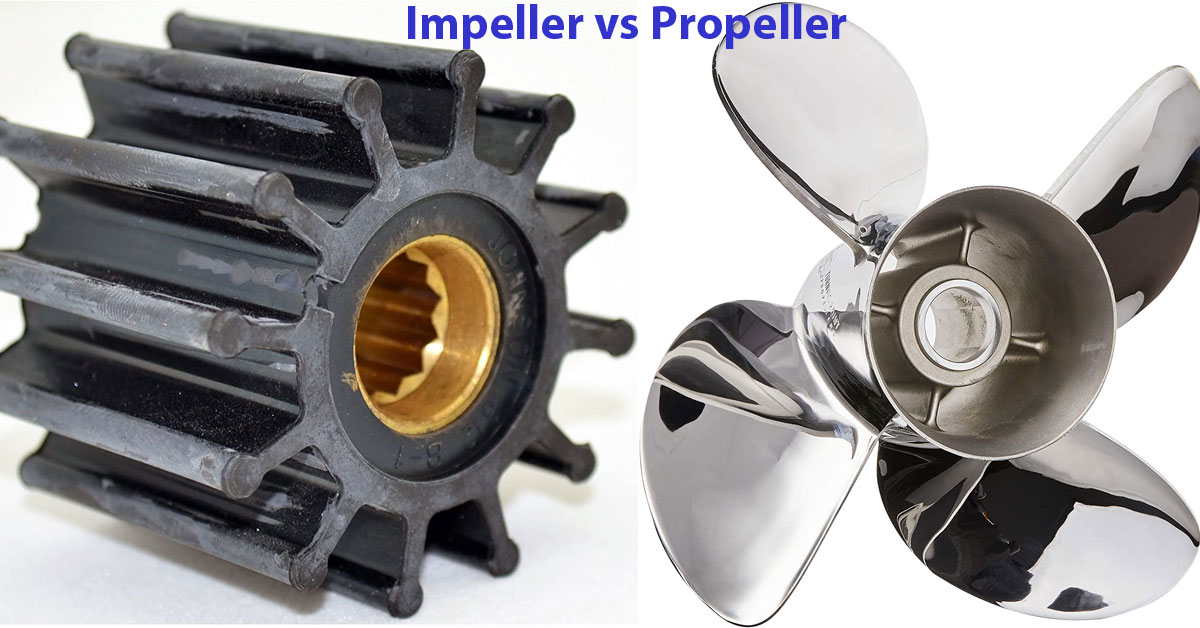Propellers and impellers are two common types of rotational flow machines. These machines are used in a variety of industries to turn fluid particles, such as gas and oil, into Useful Work. Propellers are usually found on aircraft, The blades on a propeller are usually arranged in a plane parallel to the flow of fluid. This configuration makes propellers very efficient at creating thrust, which is why they are so commonly used in aircrafts and boats.
On the other hand, impellers are more common in industrial applications. The two machines have different advantages and disadvantages, which will be discussed further in this article.
Propeller Definition, How it Works, It’s Advantages and Disadvantages

What is a propeller?
A propeller is a type of fan that helps an aircraft or boat move forward by pushing air or water backward. Propellers are typically made of metal, and there are different types depending on the vehicle they’re attached to. For example, airplane propellers have a more curved shape than boat propellers, which are more straight. Propellers are used for a variety of different applications and propellers are typically made of metal, and there are different types depending on the vehicle they’re attached to.
Types of Propeller
There are many different types of propellers, each designed for a specific purpose. The most common type is the fixed-pitch propeller, which is usually found on smaller aircraft. This propeller has a set pitch that does not change regardless of the engine’s speed or altitude. A variable-pitch propeller can be adjusted to match the engine speed and altitude, making it more efficient. This type is common on larger aircraft. Another type of propeller is the controllable-pitch propeller, which can be changed in flight to optimize performance.
A propeller can also be classified by its shape: two types are the fixed-blade propeller and the variable-blade propeller. The fixed-blade propeller has blades that are attached to the hub and do not move; this type is commonly used on boats and submarines. Propeller are usually attach with a inboard or outboard motor.
How do propeller work?
A propeller is a rotating device used to move a ship or aircraft through the air. They work by using the Magnus Effect, which is the principle that states that when a spinning object moves through a fluid (liquid or gas), it creates a pressure difference on either side of the object. This difference in pressure creates a force that pushes the object in the direction of the spin.
Advantages of propellers
Propellers are a mainstay of transportation. There are many advantages to using propellers as the primary means of transportation. Some of these advantages include:
- Propellers are very efficient at transferring energy from one point to another. This makes them perfect for transportation, as they can move large amounts of people or cargo quickly and effectively.
- Propellers are also very reliable. Once they are properly tuned, they rarely need adjustment and can last for years without issue.
- Propellers are relatively easy to maintain and repair. If there is a problem with a propeller, it can often be fixed quickly and easily by a trained technician.
- Propellers provide good stability in all weather conditions. This makes them ideal for use in both calm and windy environments alike.
- Propellers are compact and lightweight. This makes them ideal for use in smaller vehicles, such as small boats or helicopters.
Disadvantages of propellers
Propellers are one of the most commonly used types of propulsion in the world. Though they have many advantages, they also have some disadvantages. One disadvantage is that propellers are vulnerable to damage from debris in the water. If a piece of debris hits a propeller, it can damage the blades or stop the propeller from rotating. This can cause the boat to slow down or stop completely.
Another disadvantage is that propellers can be noisy. They can create a lot of noise pollution, which can be annoying for people who live near boats that use propellers.
Impeller Definition, How it Works, It’s Advantages and Disadvantages
What is an impeller?
An impeller is a device used to increase the velocity of a fluid or gas. The impeller consists of a number of blades that are attached to a central hub. As the fluid or gas flows through the impeller, the blades spin and impart energy to the fluid or gas, which increases its velocity. Impellers are commonly used in pumps and fans. For example, you can use an impeller to pump water from a lake or fluid from a well. An impeller is also used in some types of fans, such as personal computers and other electronic devices.
Types of Impeller
Impellers come in all shapes and sizes, and serve different purposes in different industries. Here are three of the most common types of impellers:
- Radial-flow impellers are used in many industries, from wastewater treatment to food processing. They are typically small and can handle a high volume of fluid.
- Axial-flow impellers are designed for high pressure and flow rates. They are often used in chemical processing and petroleum refining.
- Mixed-flow impellers combine radial and axial flow to create a more efficient design. They are commonly used in industrial applications that require both high pressure and high volume flow rates.
How does impeller work?
An impeller is a rotating device that uses centrifugal force to move fluid or air. The impeller is located in the center of a pipe or duct and when it rotates, it causes the fluid or air to be pushed outward. This can be used to move fluid or air from one location to another, or to create suction. The type of impeller that is used will depend on the specific application.
Advantages of impellers
An impeller is a rotating device used to move fluid or gas through a pipe or hose. There are many different types of impellers, but all share some common advantages.
First, impellers are very efficient at moving fluid or gas. They can move large volumes of fluid or gas quickly and with little effort. This makes them perfect for applications where speed is important, such as in water treatment plants or in cooling towers.
Second, impellers are very reliable. They typically last for years without requiring any maintenance. This makes them a cost-effective option for many applications.
Finally, impellers are easy to use and install. They can be installed in almost any type of pipe or hose, and they require very little power to operate. This makes them ideal for use in a variety of applications.
Disadvantages of impellers
One disadvantage of impellers is that they can cause turbulence and vortices in the fluid. This can cause a decrease in the overall efficiency of the system and can also lead to erosion of the impeller blades. Additionally, impellers can be quite noisy, which can be a nuisance to people nearby.
When to use impellers and propellers
There is some debate as to when it is appropriate to use impellers and propellers. Some argue that propellers are only necessary for large vessels, while others claim that impellers are better for smaller boats. The truth is that both propellers and impellers have their place, depending on the needs of the vessel.
Impellers are ideal for small boats that need to travel through shallow water. They can also be used for boats that require a great deal of power, such as speedboats or rescue boats. Impellers are able to create more power than propellers, making them a better choice for these types of vessels.
Propellers are best suited for larger boats, such as cruise ships or cargo ships. They provide more stability and propulsion than impellers, making them ideal for travelling long distances or through rough waters.
Disadvantages of impellers over propellers
One disadvantage of impellers over propellers is that they are less efficient at transferring power from the engine to the water. This can be attributed to several factors, including the greater surface area of a propeller and its higher rotational speed. Additionally, impellers are more susceptible to boat cavitation, which can cause damage to the turbine and reduce its efficiency.
Some Key differences Between Propeller and Impeller
- An impeller is a rotating component found in many devices that use fluids to transport or mix substances.
- A propeller, on the other hand, is a rotating component used to generate thrust and move objects through air or water.
- The primary difference between impellers and propellers is that impellers are designed to move fluids while propellers are designed to move objects through a medium.
- Impellers are typically found in devices such as pumps, mixers, and turbines, while propellers are typically found in devices such as boats and airplanes.
- Another key difference between impellers and propellers is their shape. Impellers are typically cup-shaped while propellers are typically blade-shaped.
So which is better?
The debate between propellers and impellers has been around for many years. Some people swear by propellers, while others prefer impellers. So, which is better?
There are many factors to consider when deciding whether propellers or impellers are better for your boat. First, you need to consider the size of your boat. If you have a small boat, an impeller may be a better choice because they are smaller and lighter than propellers. Second, you need to consider the type of engine on your boat.
If you have a gas engine, an impeller may be a better choice because they work well with gas engines. Finally, you need to consider how you plan to use your boat. If you plan to use your boat for fishing or hunting, an impeller may be a better choice because they provide more power than propellers.
Related: How to Select a Propeller for a Boat – Buying Guide!
Conclusion
In conclusion, impellers and propellers are both devices that use the power of water to create motion. However, they work in different ways and have different benefits and drawbacks. Ultimately, which one is right for you depends on your specific needs.


